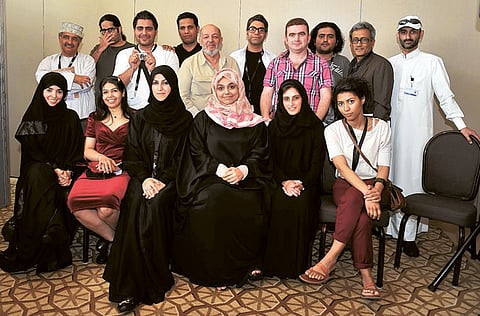Going the write way
Upcoming scriptwriters engage with industry professionals to pitch their stories

The ambience was evocative of a story-telling session: scriptwriters selected for the first Gulf Script Market for Short Films — a new initiative of the Gulf Film Festival — pitched their works to an audience of film directors and industry delegates, with passion and creative flair.
The 14 writers selected from over a 100 submissions went through a rigorous mentoring session led by Egyptian director and scriptwriter Mohammad Khan, award-winning Lebanese director, scriptwriter and film entrepreneur Michel Kammoun and Bahraini author and scriptwriter Fareed Ramadan.
The stories narrated by the selected writers from the UAE, Bahrain, Qatar, Iraq and Belgium ranged from social commentaries to surreal dramas — almost all of them drawing inspiration from everyday realities. The pitching session was followed by an open interaction between the industry professionals and the writers, with several pertinent concerns raised. One of the issues raised by directors who attended the session was the difficulty in finding child actor talent for the scripts, given that several of them had children or youngsters as protagonists.
Author and scriptwriter Ramadan said, "We taught the students the formation of the script right from the time the idea strikes. It's very important to develop a log line first, which describes the script in one sentence. Then one must move on to formulating the synopsis and only then will a script actualise. Dialogue writing should be kept for the last because there may be times when the scene would say it all and there won't be any need for dialogues."
Ambitious
Khan said that the scripts selected were ambitious and were stories that needed to be told to the world. He explained that the sessions focused on polishing the scripts and motivating the writers to continue their good work, giving them a clearer direction of the structure.
Kammoun said, "We had to work on various levels to perfect the script and script-writing follows more of a story-telling technique. I have taught my students not to forget the original intentions while drafting the script. The idea has to be intact."
The Gulf Script Market for Short Films is paired with the GFF's existing $250,000 (Dh918,300) Enjaaz annual production fund for Gulf short films to create a support programme for emerging and established scriptwriters, directors and other film talent from the region.
Amal Al Dowaila, an Emirati writer who presented her script, Rain — a story about the intense longing of a young girl to play in the rain — said one of the benefits of the mentoring and pitching sessions of the Gulf Script Market was that they helped writers to engage with directors and industry professionals who are not normally accessible to new writers. "When I first drafted the script, I envisaged it as a dream; after the mentoring sessions, I converted it into a real story. The sessions were really helpful in further strengthening the script."
Fat'hiya Nasser, a writer from Bahrain, presented Life — a story about two young men involved in an accident. She said the sessions helped in "tightening her script".
"There were several characters in my first draft; the sessions helped me to cut the extras, and make the script crisper so that the main message could be communicated with impact and conviction," she said.
Writer Shaikha Al Ayali said that the mentoring sessions taught her a lot of technicalities she wasn't aware of before. "For the pitching, the mentors showed us how to control our body language and express with our hands," she said. Shaikha, who narrated her story, 563 Dirhams, about a boy who works tirelessly to raise money for his mother's medicine, added: "I think this is a wonderful opportunity, especially for Emirati women, to address their own issues and causes through cinema."
Sign up for the Daily Briefing
Get the latest news and updates straight to your inbox



